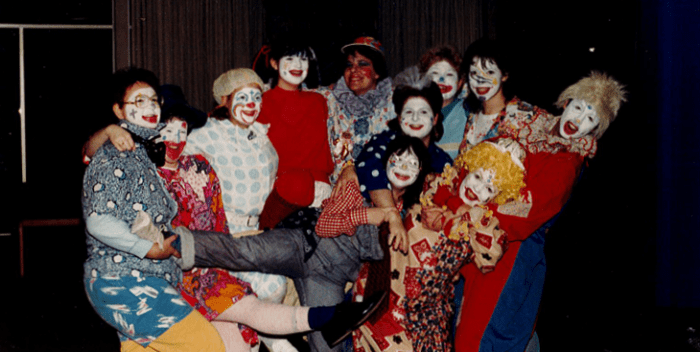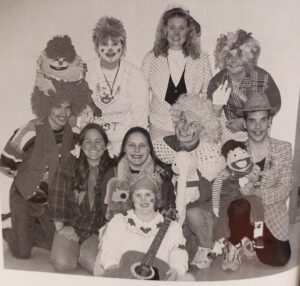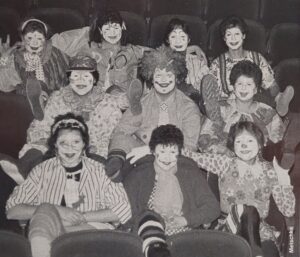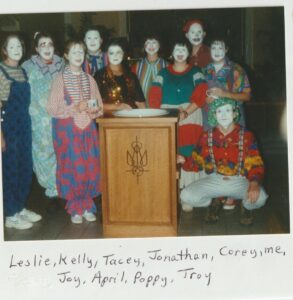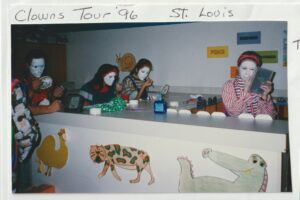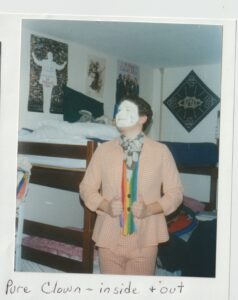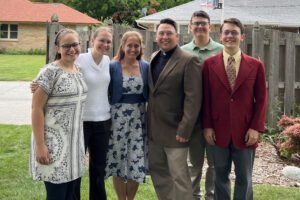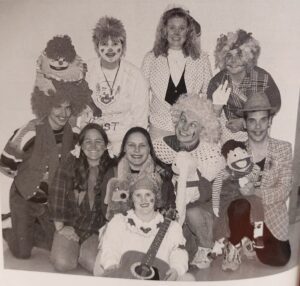Clowns for Christ Spread the Love of Jesus With Humor
Clowns for Christ in 1987.
Photo credit: Concordia Archive
By Nora Betts
Do you think of clowns when you picture a church service?
Clowns for Christ had a unique approach to Christian ministry from 1977 to 2005 as a student-led club at Concordia University, Nebraska.
Clown ministry may seem like an oxymoron, but the 1996 yearbook entry for the club points out “that our whole life with God is sacred, even the silly times.”
And silly times there were! The club members, affectionately called “clowns,” wore painted faces and bright-colored clothes, and had beaming smiles as they shared God’s love on and off campus.
The clowns performed skits and songs for children in schools, churches and hospitals, brought joy to nursing home residents, and went on tours to share the Gospel message through the power of laughter.
Several clowns from the ‘80s and ‘90s recalled memories of fun, fellowship and foolishness during their times in Clowns for Christ. For many, the club gave them priceless practice for their future vocations, and for some, the club introduced them to their future spouses!
Why become a clown?
Kristi (Kriete) Schkade joined Clowns for Christ as a freshman in 1994 because she thought it looked fun at the Student Activities Fair.
“I joined as a freshman because I wanted to be involved in an activity that looked fun,” said Kristi. “The campus center had been set up with several stations ‘advertising’ clubs and activities. Clowns stuck out, of course, because of the members with crazy costumes and makeup.”
Rachel (Selle) Baker joined in 1992 for similar reasons. She said she loved creative ministry and working with children, and also liked the idea of hiding her self-consciousness behind clown makeup.
“I remember seeing the Clowns for Christ booth at the Activities Fair and thinking ‘This is something I can do!’” Rachel said. “I loved singing and acting, puppets and working with children, but I was very self-conscious, so the idea of hiding behind clown makeup greatly appealed to me.”
What does it mean to be a Clown for Christ?
Kristi said the “theme verses” for Clowns for Christ pointed out how God uses what is foolish in the world to shame the wise. Kristi said that the clowns were not afraid to look foolish for the sake of the Gospel because they based their ministry on Bible verses like 1 Corinthians 3:18-19a.
1 Corinthians 3:18-19a states: “Let no one deceive himself. If anyone among you thinks that he is wise in this age, let him become a fool that he may become wise. For the wisdom of this world is folly with God.”
What did clown ministry look like?
Joy (Malchow) Barefoot was a member of Clowns for Christ in the late 1980s and said the clowns wrote their own skits and critiqued them as a group.
“One or two of us would get together and write a skit and then we’d all kind of critique it,” said Barefoot. “We all kind of worked together to edit it, revise it, make it better.”
Kristi, who was a clown a few years after Barefoot, said the club held weekly meetings in the basement of Becker Hall to practice skits and songs and come up with new ones. She said that most of the skits were spoken but a few were mimed.
Clowns for Christ followed an order of service through their skits, Barefoot said. The clowns were able to put together an entire worship service, from an invocation to a Bible lesson.
“We kind of did a variety [of skits],” Barefoot said. “We had some that fit the order of the service – so we had an invocation one, we had a blessing one, we had prayer, we had a benediction one – and then we had skits that would fit with parables that Jesus told or actual Bible lessons either from the Old Testament or the New Testament.”
She said the clowns were able to lead an entire worship service with this format.
“It was geared so we could kind of do a whole church service with just the clowns acting out the different parts of it,” Barefoot said. “And then we had songs and the songs usually had actions that went with it.”
Kristi said the clowns made sure the audience understood the message behind each skit. Each skit had a Bible reading, audience discussion and song that went along with it.
“Our performances were a series of the following format: a skit, Bible reading to go with the skit, an audience-involved discussion of how the skit and scripture tie together and the Jesus lesson we learn from them, and a song to go with that theme,” said Kristi. “Depending on the length of time given, we usually performed five or six skits.”
Kristi said the benediction skit performed by the clowns usually had a great impact on the audience.
“At the end of the performance, two clowns would hold up a giant piece of paper that had the word “Peace” written on it,” she said. “A clown would sing a Benediction song, then say ‘God’s peace be with us.’ Then the clowns would rip that paper and give each audience member a ‘piece of peace.’ We always got a great reaction from the crowd, and it left them a tangible reminder of why we were there.”
Barefoot said that Clowns for Christ even spread the Gospel through their painted faces. The clowns incorporated both a cross and a smiley face into their makeup, but they had creative liberty with the rest of their costumes.
“We were each able to do our own unique costume but there were two requirements: We had to have a cross somewhere on our facial makeup and we had to have a smiley face somewhere – either the big smile on our own smile or somewhere [else on our makeup],” said Barefoot. “For the costume itself, we could be creative, we could change it each year if we wanted to.”
All sorts of ministry
Kristi said Clowns for Christ sent letters to many Seward-area churches at the beginning of the school year, which is what prompted many of the club’s off-campus performances. She also said the club led chapel on campus about once a year.
Rachel said she remembered the variety of ministry opportunities within Clowns for Christ. She said they performed skits, sang songs and overall shared the love of Jesus with children in churches, schools and hospitals, as well as with people in nursing homes.
“My memories of Clowns for Christ are kind of a mishmash of happy times,” Rachel said. “Visiting churches and schools, leading chapels and children’s sermons. Kids watching us doing a skit or a mime – so quiet in the room you could hear a pin drop.”
She said along with visiting nursing homes, the troupe went to hospitals, “even though we couldn’t do a whole program, we were able to go room to room and visit the kids, handing out balloons and showing the love of Jesus.”
Clowns for Christ found unique opportunities to spread the gospel even outside a church or school setting, Barefoot said. She remembered one Halloween when the group went reverse-trick-or-treating.
“For Halloween, we went trick or treating, except instead of us begging for treats, we had bags of treats and we had a Gospel tract that we also included with that. So we went to the neighborhood spreading the good news, you might say,” Barefoot said.
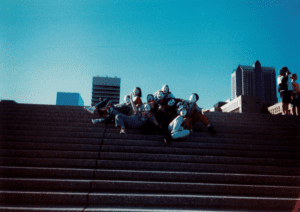
Clowns for Christ visits the Gateway Arch in St. Louis, Mo., on their 1987 tour. Photo: Concordia archive.
Clowns on tour
Clowns for Christ usually went on tour over Fall Break, setting up performances at as many churches and schools as possible along a decided route, said Kristi. She said the tour routes often included some clowns’ home churches.
“The biggest event of the year was our tour, held during mid-semester break in October,” said Kristi. “The leader decided the direction to go and sent letters to as many Lutheran schools (and) churches along that path as possible. Often, the tours were designed to include the home churches of the current Clowns members.”
Kristi said the Fall Break tour was a great bonding experience for the clowns. “We rode on tour together in one of the 15-passenger vans, so it was always a great time for the clowns to really bond and get to know each other,” she said.
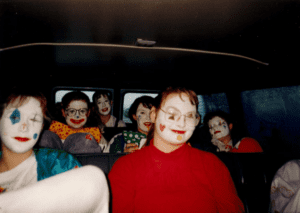
A van full of clowns wears face paint and costumes during their 1987 tour. Photo: Concordia archive.
Kristi led Clowns for Christ on tour to St. Louis, Missouri, when she was the club leader from 1996-1997. She said she remembered the whole van full of clowns wearing their makeup with pride as they drove through the city.
“My favorite part of St. Louis was driving the school van through the city while we were in our clown makeup,” she said. “We made sure the windows were open so all could see us!”
Kristi also led the following year’s Fall Break tour to Iowa when she was a senior. She said they stopped at her home church and that it was a special experience to perform for the adults and children she knew.
“It was quite special to perform at my church in front of adults who watched me grow up physically and spiritually and kids who were that next generation that I was preparing to teach wherever I got my first call,” said Kristi.
Troy Bauer was a clown for several years before his graduation in 2000. He said he enjoyed traveling with Clowns for Christ on tour and meeting new people while sharing the Gospel.
“It was great meeting different people and new congregations as we were an ambassador of God’s Word,” said Bauer.
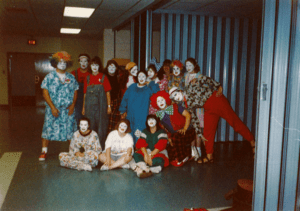
Clowns for Christ in 1995, including Rachel (Selle) Baker, David Baker, Kristi (Kriete) Schkade, and Jonathan Schkade. Photo: Concordia archive.
Clowns can be romantic!
Many clowns say that more than just the memories have endured since their time at Concordia. Several of them met their spouses in Clowns for Christ!
Bauer met his wife, Melissa, in Clowns for Christ, which he said gave her quite the first impression of him.
“We first met through Clowns and it went from there — although at first she thought I was quite the strange one,” he said.
Rachel came from an LCMS missionary family in the Philippines and said she felt lost and lonely starting college. She said she found not only a “home away from home” in ministry groups like Clowns for Christ, but she also found her husband!
She met David Baker when she was a junior and said the two of them ended up in many of the same activities.
“I met my husband at Concordia in 1994,” said Rachel. “He was a freshman and I was a junior. His big sister, one of my good friends, was a sophomore that year and she introduced us as Dave was helping her move into her dorm room and set up her lofts.
“That was the beginning! It turns out we were involved in a lot of the same ministries: Concordia Youth Ministries, Concordia Singers, various Bible study and prayer groups and Clowns for Christ!”
Kristi also met her husband, Jonathan Schkade, in the group. She said that two of his college roommates, including David, were in Clowns. They got together with clown girls and are now married couples as well.
Kristi said she and Jonathan had similar personalities and talents, which is why they each joined Clowns for Christ.
“Clowns suited both Jonathan and me because we have inner-kid-energy and outlook, as well as experience with drama and music,” Kristi said.
A clown community
Bauer said the clowns had just as much of an impact on each other as they did on their audience.
“We weren’t just an outreach to others, but also an outreach for each other,” he said. “We opened in devotions, led each other in prayer, and generally lifted each other’s spirits.”
Kristi said Clowns for Christ allowed its members to form uniquely genuine friendships with each other.
“The friendships we made during that time were fantastic,” she said. “There aren’t many official groups where the core activity encourages the members to let their hair down and show off their inner child, so we really learned about a different side of people than others got to see.”
Clowns called to teach
Many clowns were education majors who said they applied what they learned in the club to their teaching careers.
Barefoot said the group attracted many education majors because it incorporated a love of children with a heart for Christian service.
“[An education major] kind of fit with, if you love children and you like sharing Christ, you’re in that program and it fits with Clowns for Christ really well, too,” she said.
Barefoot graduated from Concordia in 1989 and is now a second-grade teacher at Zion Lutheran School in Kearney.
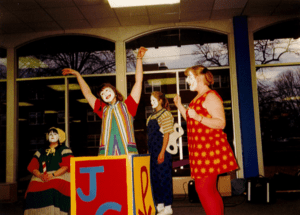
Kristi (Kriete) Schkade pops out of a box as part of a Clowns for Christ performance in the Janzow Campus Center in 1997. Photo: Concordia archive.
Kristi, now a sixth- grade teacher at Hope Lutheran School in Shawnee, Kansas, said Clowns for Christ “fulfilled my desire to reach kids in a fun, meaningful, memorable way to share Jesus with them.”
Kristi said she continues to use the songs and skits from Clowns for Christ in her teaching career. One skit she said she loves to reuse is the “Noah” skit which involves pulling unsuspecting audience members onstage to be the animals on the ark.
“I’ve taught some of the skits to my classes, and have performed the ‘Noah’ skit a few times, too,” Kristi said. “That’s a fun one because the clown is Noah, and the animals are unsuspecting members of the audience who get pulled up to the stage, ‘dressed’ to represent the animals.” She said suitcases represented elephant trunks, ties were for giraffes, bananas for monkeys and, for the biggest laugh, long strips of toilet paper tucked into the back of a popular adult’s (often the principal) collar to represent the skunk!
Missionary clowns
Rachel said Clowns for Christ continues to play a valuable role in her ministry, as she and David have served as foreign missionaries in Asia for the past 20 years. They use things like skits that they learned as clowns to break the language barrier with the children they serve.
Rachel said she and David minister to a largely Muslim population in Asia by using skits, songs and ideas from their “Clown Toolbox.”
“While the memories tend to be a joyful jumble, the skits and songs we did over and over still minister to me, to our family and to others here in Central Asia, where we continue to share our faith and our lives with a Muslim people group,” she said.
Rachel said her family loves making and using puppets in their ministry.
“We learned to use puppets in Clowns for Christ, and we have made and used puppets here as well, teaching our children how to use them in ministry, writing our own skits and plugging in local youth to help with performing them,” she said.
The kids of clowns
Rachel said their passion for ministry carries on in their children, two of whom, junior Julia and freshman Timothy, are students at Concordia.
Timothy said his parents’ involvement in Clowns for Christ left an impact on his life and enriched his childhood. He knew his parents were good at things like skits and songs, but did not always know those skills stemmed from Clowns for Christ.
“As a kid, I knew my parents were very good at all sorts of random fun stuff, but it took me a while to realize that a lot of those things came from being clowns,” he said. “There are probably still obscure family traditions that I don’t know really stem from those consequential moments behind makeup.”
Timothy said he and his three siblings learned to be secondhand Clowns for Christ through their parents.
“A lot of clownish skills were instilled in my siblings and I from early on: singing, puppetry, acting, general kid-entertaining skills, craftsy stuff like making paper hats and balloon animals, and of course great senses of humor,” he said.
He said he has a childhood memory of his family teaching kids the Gospel with a dog puppet.
“I recall that in the distant past, when we lived in Kazakhstan and we often had family home-church (and) Sunday school in English at our house, there was a dog puppet named Rufus that would share a little story to illustrate whatever we learned that day,” Timothy said. “We all loved Rufus. I imagine that a lot of that sort of thing was a direct result of Clowns for Christ.”
Timothy said Clowns for Christ left a unique impact on his life and personality, even being a generation removed from the club.
“It seems like Clowns for Christ was a really neat ministry that touched a lot of people’s lives, both recipients and participants, and certainly mine. I guess weird makeup and everyone expecting you to entertain them builds awesome people skills,” said Timothy. “We need more things like it!”
“Bring it back!”
Many clowns said they want Clowns for Christ to make a comeback. The club was mentioned in Concordia yearbooks from 1977 to 2005, but clowns have been absent from campus for nearly 20 years.
Kristi said Clowns for Christ was a valuable way to train future teachers, pastors and directors of Christian education for their vocations.
“Jonathan and I are sad that Clowns for Christ no longer exists at Concordia,” said Kristi. “It was a unique way to share Jesus with people. It was also a great way for budding teachers, pastors, and DCEs [Directors of Christian Education] to practice working with kids and meet them at their level. Let’s face it, teaching and preaching are a lot like performing in many ways. You have to command an audience and get your point across in X-amount of time. Then you hope it sticks!”
Rachel said Clowns for Christ left its mark on her life in a way that no other club could.
She said Clowns for Christ touched the hearts of children, teachers, and church workers who watched their performances as well as Rachel’s family and those whom they serve overseas.
“The obvious impact was back then, a very positive impact to the children and people we shared with and the teachers and church workers who observed us and were maybe encouraged to do things like that themselves in their own ministries,” said Rachel. “The far-reaching impact is how it continues to affect me and every ministry I was or am currently involved in.”
Rachel said she hopes for a rebirth of Clowns for Christ at Concordia because it is such a uniquely impactful ministry.
“It would be so exciting if a Clowns group started up again at Concordia in the future!” said Rachel. “It is a niche that is not really filled by any other group.”


